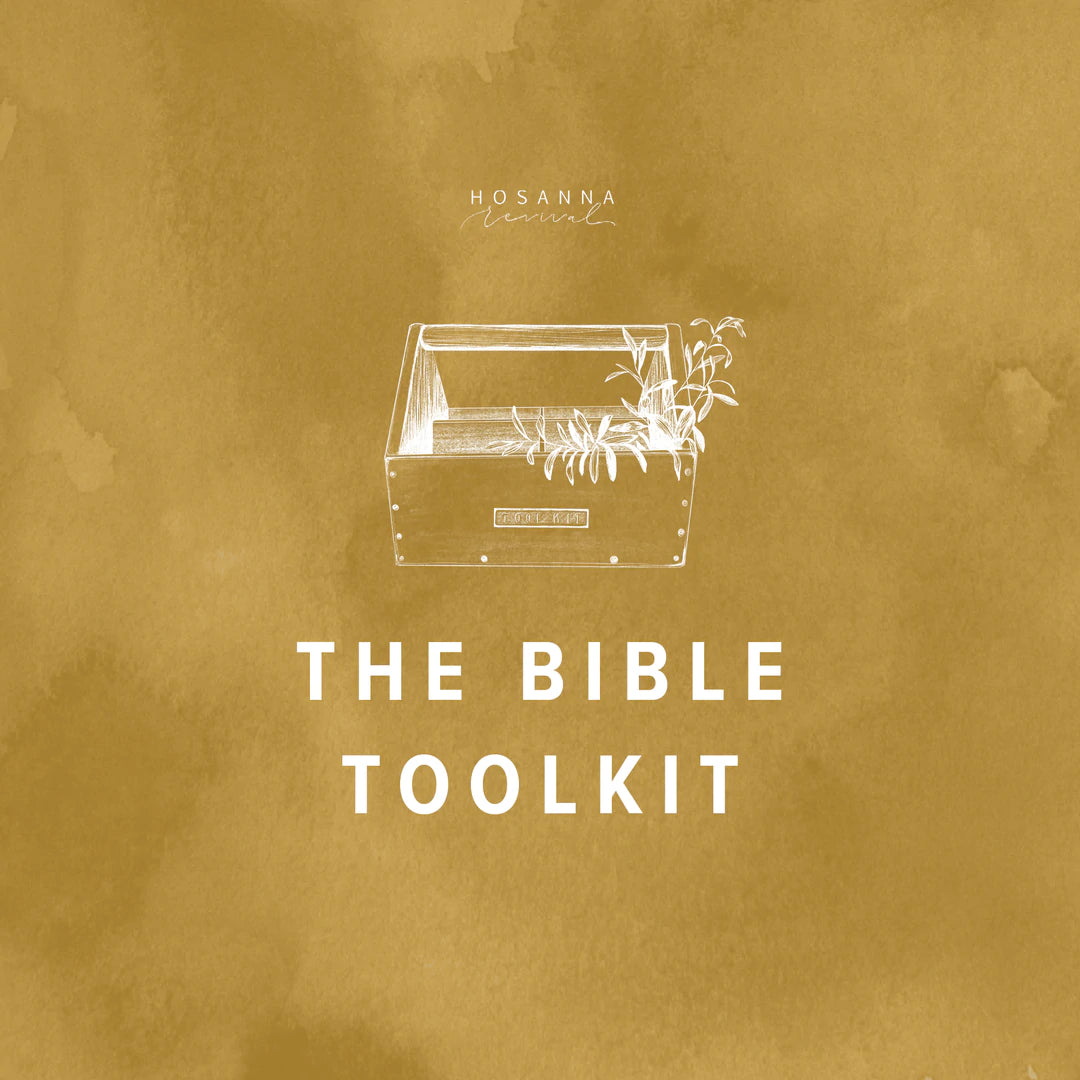Bible
ToolKit
ToolKit
Are you new to the Bible? Perhaps you’ve been following Jesus for a while but aren’t sure how to navigate your Bible. Or maybe you’re simply exploring what it means to follow Jesus and know the Bible has something to do with that. No matter what point you’re at in your journey, this guide is for you.
In The Bible Toolkit, we’ll walk you through the process of diving into the Word of God—from why you should read the Bible to navigating the pages within to what happens after you close the cover. Let’s dive in!
Looking for our free resources from the Toolkit?
Scroll to the bottom of this page for links and more!
If I were sitting next to you right now as you think about reading your Bible, I would want you to know a few things.
First, I would tell you that I am overjoyed that you would even consider reading the words in this precious book, because they are truly sacred. The Bible is the tangible Word of God—the God who created the universe, sees all things, and knows your name.
Second, I would tell you that the Bible is the complete and true story of our being and purpose. When you crack this book open, you will find stories full of triumph, wilderness, waiting, and ultimately, a Savior who came in the name of love.
As you hold a copy of the Bible in your hands, I pray that you will feel God’s love radiating out of its pages. Please know the words inside this book and the simple act of reading them will change your life. The echoes of God’s glory will reach the ends of the earth because of the work he is doing in you.
“You will seek me and find me if you seek me with all your heart”
—Jeremiah 29:13—
We believe that the Bible, consisting of sixty-six books, is the only holy, inspired, trustworthy and true Word of God. We believe there is one God, the Creator of all things, infinitely holy and eternally existent in three persons—Father, Son, and Holy Spirit. The Bible is without error, and is the only final authority in all matters of faith and practice. We believe that the true beauty of the Bible absolutely lies within its pages. Above all else, we are convinced that the words inside of this timeless book will revive our world.
You will discover who God is.
You will hear stories of his greatness and his might.
You will discover that God is deeply intentional and specific with every part of this world.
You will learn that his love for you burns brighter than any you have known before.
You will see clearly that he has a call on your life and a plan for this earth that ends in a beautiful victory.
As you read about God, you will be equipped to articulate and share the gospel with others.
As Scripture takes root in your heart, you will be able to stand on God’s truth and resist the enemy’s lies.
As you start to believe that God is who he says he is, you will begin to put your trust in him in ways you never imagined—strengthening your faith day by day and spreading the name of Jesus on this earth.
In this section, we want to address some barriers that might be standing between you and the Bible. These barriers might be topics you don’t understand, doubts about who God is, or struggles with comprehending what Scripture is saying. It’s okay to wrestle with these things—it shows you’re searching for the truth. We encourage you to hold these barriers up to the light of Scripture and seek wisdom as you navigate them. God welcomes your honesty. We are safe with him. Click a dropdown arrow below to explore whichever question resonates with you.
The Bible was written over a period of about 1,500 years by more than forty different men of diverse backgrounds. Among this diverse group of writers are kings (David and Solomon), a military general (Joshua), a fisherman (Peter), and even a tent maker (Paul). Some of the books of the Bible were written from prison cells, the wilderness, exile, palaces, and more. There are books of historical narrative, poetry, letters, and eyewitness accounts of Jesus’s time on earth. All of this alone makes the Bible a unique book.
What truly sets the Bible apart from all other books—including other holy books—is that it has one ultimate author: God. Peter wrote in 2 Peter 1:21, “For no prophecy was ever produced by the will of man, but men spoke from God as they were carried along by the Holy Spirit” (ESV). Every book of the Bible—though written by many different people in many different places over a long period of time—tells one perfectly unified story because its author is God himself. Every word of the Bible is “breathed out” by God (2 Timothy 3:16) and is therefore holy, without error, and perfectly true. Even when we encounter challenging content within these pages, we can enter with this foundation of truth and take our understanding and wrestling before him with the humility to seek his heart within these pages.
The doctrine that defines which books are considered part of the Bible is called canonicity. We could spend hours diving into this doctrine, but in this toolkit, we’ll offer a simple answer that we hope will get to the heart of the question. For context, the additional books included in Catholic Bibles were recorded after Old Testament books but before Jesus walked this earth. These books make up what is traditionally called the Apocrypha. In his earthly ministry, Jesus affirmed the Old Testament and authorized his apostles to write the New Testament, but he never affirmed or even cited the apocryphal writings. We believe in the absolute authority of Jesus, and we therefore affirm what he affirmed.
A study of the four gospel accounts in Scripture reveals Jesus affirmed the whole of the Old Testament, accounting for the total of sixty-six books when paired with the New Testament writings (Matthew 5:17–18). He affirmed it as a reliable record of history (cf. Matthew 10:15; 12:40; 19:3–5; 24:38–39) and prophetic accuracy (Matthew 26:54). He affirmed it as sufficient (Luke 16:31), unified (Luke 24:27, 44), without error (Matthew 22:29; John 17:17), infallible (John 10:35), and authoritative (Matthew 21:13, 16, 42). History also shows that first-century Jews did not consider the apocryphal writings to be canonical Scripture, and neither did Jesus. So while these writings are rich with historical context, they do not serve as an essential foundation for knowing God.
The Bible—God’s written words to us—is the primary way in which he has chosen to reveal himself to us. It is literally God’s letter to us. Imagine the feeling of receiving a letter in the mail from someone you love dearly. Are you excited to open and read it? Or does it evoke feelings of boredom?
In truth, our view of Scripture is directly related to our view of God. The Bible is not boring because God is not boring. A life of obedience to Christ is a life of adventure. The Bible is filled with stories where God calls his followers into this adventure. When our minds and hearts are aligned with the reality that God is our loving Father who desires to commune with us through his Word and invite us into this adventure, it comes alive!
If you are struggling to find Scripture interesting, read a modern translation that you find easy to understand. We recommend the NLT if you are just beginning or the ESV if you wish to dive into deep study right away. As you read, try journaling your thoughts and answering these questions:
1. What does this text reveal about God?
2. How am I to live in light of that?
Check out our WHEN article "When the Bible Doesn't Feel Exciting"
For many years, modern scholars have challenged the authenticity and truthfulness of Scripture by comparing it to ancient legends and searching out errors within the text. However, a variety of evidence reveals quite the opposite. In fact, the Bible could be considered one of most astounding primary texts in history given the breadth of consistency and cross-reference both within and without the text. Between all the manuscripts available to us, the margin of error is less than 1%, and, even then, the discrepancies do not raise confusion to the meaning of the text or change the doctrine of Scripture. Thus, despite the challenges scholars have raised to the Bible, it continues to prove itself a legitimage historical text relating true events. When pairing this evidence with the claim the Bible presents of this being the very Word of God and thus revealing God’s heart for our lives, the question becomes not just, “Is it true?” but, “Will it be true for me?”
If you are asking this question, take a moment to explore whether there is a more specific why behind your ask. Have you been surrounded by people who discredit the Bible—or seem to support it blindly? Are there parts of it you are uncomfortable with or simply don’t like? The beauty of God’s character is that he does not shy away from your hard questions. We encourage you to take the time to explore your questions while at the same time challenge you to consider what it would look like to enter into reading his Word from the posture of trusting it as truth. Take heart, God delights in revealing to you the treasure you hold!
The Bible is a complex book containing deep, rich truths. It is normal to find it confusing and difficult to understand at times. But it is not unknowable. In fact, one way the Holy Spirit of God ministers to us is opening our eyes to understand the beauty and truth in the Word of God. God does not withhold good from his children, and that includes the Holy Spirit (Ephesians 1:13). If you belong to Jesus, the Holy Spirit lives in you, and will “guide you into all truth” (John 16:13). There are hard things in Scripture, but we’re never meant to understand them all on our own. A couple tips:
The Holy Spirit of God authored the Bible. He is present with you and is willing and ready to help you understand it.
Sometimes, the Bible seems like an unclimbable mountain of sixty-six books divided into 1,189 chapters. We can discourage ourselves by thinking we have to read a certain amount every time we open it or that we have to read through the Bible at least once every year. Those aren’t bad things; in fact, spiritual discipline is very important in the life of the Christian. Although just fifteen minutes of daily reading will get you through the whole Bible in a year, many us still find ourselves saying we “don’t have enough time.” What if we don’t actually need more time; we simply need to better prioritize the time we have?
If we truly believe God is who he says he is and that the Bible truly is God’s Word, we will rearrange our priorities around God, rather than giving him what’s left. In this guide, you will find many practical tips that will spur you on to make space for God’s Word.
Check out our WHEN article "When Reading the Bible is Hard to Prioritize"
If you don’t already own a Bible, one of the first steps towards diving into Scripture is to choose your translation. The question you need to ask yourself is, “Do I want to prioritize readability or accuracy?” Your answer to this question will land you at a particular place in the spectrum of Bible translations, which we'll dive into below.
ESV, CSB, NLT—all these names can feel like a jumble of letters, but behind each of them is a specific approach to translating the original texts of the Bible into English that provides a variety of options when choosing your Bible translation. Below are three main points along the spectrum of Bible translations.
Goal: To carefully translate each word from the original language to the closest equivalent in the English language.
Pros: Very literal
Cons: A bit more difficult to understand
Recommended For: In-depth study and personal development
Translations in this Category: NASB, ESV, NET, KJV, NKJV
ESV Sample Verse: For in him the whole fullness of deity dwells bodily, and you have been filled in him, who is the head of all rule and authority.
Goal: To strike a balance between a more literal and paraphrase translation
Pros: Easier to understand while still preserving the feel of the original language
Cons: Not as identical as the original text
Recommended For: A balance between categories
Translations in this Category: CSB
CSB Sample Verse: For the entire fullness of God’s nature dwells bodily in Christ, and you have been filled by him, who is the head over every ruler and authority.

Goal: To consider how the original audience would have understood the text, and render the same thought to its current reader
Pros: Easier to read
Cons: Not always as accurate to the original text
Recommended For: Someone new to the Bible, group studies
Translations in this Category: NIV, NLT, CEB, NIRV, GNT, MSG
NLT Sample Verse: For in Christ lives all the fullness of God in a human body. So you also are complete through your union with Christ, who is the head over every ruler and authority.
Now that you’ve got an idea of your preferred translation, you’re ready to open up the Bible! And to be honest, even though this seems simple, sometimes this is the hardest step. Whether the thought of opening this huge book feels overwhelming, or whether you simply don’t want to, we can promise that the words inside will change your life. Remember this: one sentence of God’s Word read over your life has more power than any self-help book or motivational quote.
The Bible is divided into two main sections: the Old Testament, which covers the time before Jesus was born, and the New Testament, which focuses on Jesus’s life, ministry, and beyond. Together, these sections—containing a total of sixty-six individual books inspired by God and written by more than forty different individuals throughout history—tell one complete story of who God is and what he has done. The books are divided into chapters and verses to help you find specific parts of the story. Next, we’ve included a breakdown of each section of the Bible. Print out our guide here to take alongside you as you learn.

The Beginning: The story of the Bible begins with God, then his Creation. God, man, and all the animals lived together in perfect harmony and peace. But when Adam and Eve sinned, it all came crashing down. Adam and Eve were created holy and perfectly happy in God’s creation, but that perfect harmony with God was destroyed and the earth was cursed as a result of their sin.
The Account of Israel: The story of Israel is a fairly similar narrative. God saves Abraham’s descendants from Egyptian slavery and exile and leads them into a lush, green land he promised to Abraham hundreds of years earlier. But just like Adam, the children of Israel rebelled against God and were exiled from the Promised Land.
How it Ends: The Old Testament ends with the children of Israel—Abraham’s descendants—returning to the Promised Land, but it is no longer the paradise it once was. They are still in exile under foreign rule. There is conflict and pain. The weight of the curse still remained, but so did the promise of God to send a Savior—the Messiah—to break this curse and put an end to suffering once and for all. But the question remained: when and how would God fulfill this long-awaited promise?
The Beginning: After 400 years of silence, Israel is still in exile under the Romans. They are eagerly awaiting the promised Messiah, foretold by prophets of old. They longed for him, believing that when he came he would set all things right. And he would—but not the way they thought he would.
The Account of Jesus: Jesus did not overthrow the government and become their king. Instead, he had come for a much greater purpose: to break the curse of sin. Jesus came to live a perfect life and die in the place of sinners, reconciling them back to God—bringing us back to the garden paradise where we can once again have perfect harmony and peace with God.
How it Ends: The New Testament ends with the promise of a future in a new heaven and a new earth. No more sin, no more curse, no more sickness, no more death. God will make all things new and will once again dwell with his people.

There is much more than what we feature here. In our free downloadable PDF guide, we’ll dive even deeper into sections and individual books! Download and print the guide here!
Bible reading typically happens in one of two ways, explained below.
Choose a book of the Bible and read through it from beginning to end. It can be helpful to find study questions or commentary as you take this bare-bones approach.
Follow along with a Bible study that points out different Scriptures for you to read each day. Bible studies typically include commentary and references that relate to a specific topic or guide you through a book.
If you are reading the Word for the first time, we suggest you start with John, a book at the beginning of the New Testament that details the life of Jesus. To get you started, here is a reading plan of the book of John. Our hope is that this guide will help you ask good questions and look at Scripture a little bit deeper.
Have a Plan: Having a plan to work through a specific book of the Bible encourages routine and consistency. Knowing exactly where you’re headed before you begin helps build structure and discipline into your daily time with God. In this toolkit, we share two reading plans to help you begin your time in the Word.
Schedule a Time: Having a specific time of day that you read your Bible helps build consistency into your daily rhythms. Include it in your calendar, whether it’s in your planner, Google calendar, or in your reminders. Take a step in personal accountability by writing it down.
Set the Scene: Prepare your environment to provide a space to focus. Remember, this does not have to be perfect! What is most important is that you show up before the Lord.
Start with Prayer: Always begin with prayer. When you open the Bible, ask God to teach you exactly what you need through his Word. Ask him to calm your mind, help you focus, and allow you to receive what he has to say. Pray that your time reading the Word would spark worship in your heart.
—pause to open your Bible right now—
The Bible tells us to dwell on the Word. Jesus himself says in John 15:4, “Abide in me, and I in you. As the branch cannot bear fruit by itself, unless it abides in the vine, neither can you, unless you abide in me” (ESV). Here are some practical ways to abide in Jesus as you read Scripture.
Journal Alongside Scripture
Journaling alongside the Word looks different for everyone, but here are some ways to begin:
Before: Lay your joys and concerns before Jesus by journaling initial thoughts or prayers.
During: Copy down meaningful verses in a journal or directly in your Bible while you read.
After: Summarize what you just read and any application you’re taking with you.
Memorize Scripture
Choose a core verse or phrase from your reading to memorize.
Pray Scripture
Turn Scripture into a guide for prayer by praying the words over yourself or someone else.
Supplement Scripture
Look up materials online to reference alongside your reading. Use StudyLight.org to access dozens of commentaries on any given verse.
—pause and actually read Scripture right here, right now—
We hope this toolkit has equipped you to dive into God’s Word with confidence. But what happens after you close the pages of your Bible? After reading the Word, don’t let the words stay on the page. Instead, let God write his Word on your heart, allowing it to shape your thoughts, actions, and everyday life.
“And let us consider how to stir up one another to love and good works, not neglecting to meet together, as is the habit of some, but encouraging one another, and all the more as you see the Day drawing near.”
—Hebrews 10:24-25—

We were never meant to do this alone! Find a friend to read the Bible and share life with. This step takes an ounce of courage! Be brave and ask someone to connect you with a person to read with—maybe it’s the friend who gave you a Bible or someone from your local church. Either way, be brave and simply ask. There is someone so excited to read the Bible with you and share life with you!
Our greatest hope is that you get connected in a gospel-centered local church. Being involved in a church means becoming a part of the body of Christ, to serve and love those around you, and to cultivate a community that glorifies God. If you don’t already have a home church, look up churches in your area and commit to visiting at least one within the next month. Again, this step takes so much courage. If you are finding it hard to connect, begin this step with prayer. We are confident that God will be faithful to connect you with his children in your area, so seek him as you seek out others.

Even if you follow these steps, reading the Bible may not always be easy. The reality of life on earth is that ruts and dry spells can threaten to interrupt our time with Jesus, but pushing past these moments to stay rooted in the Word of God is worth it. Next, we’ll share some practical examples of how you can do this.
Lean into Community: Text a friend who knows Jesus or reach out to someone at church to meet up. Sometimes simply hearing someone else’s story will stir excitement in you as you hear how God is working right here and now.
Find a New Study: We are big believers that getting your hands on something new and beautiful stirs your heart to want to jump in. Consider seeking out a fresh perspective from an online study or grab a new devotional to reignite your passion! Our devotional library offers a variety of topics for your specific season.
Start in the Psalms: When life feels heavy or you are long passages of Scripture feel overwhleming, the book of Psalms is the perfect place to start. These brief yet powerful passages capture songs of praise, lament, and wrestling that reflect the real emotions of everyday life. Read one psalm a day to intentionally point your heart toward the Lord in worship.
Read our WHEN articles: We’ve compiled a variety of responses to this topic from writers in our local community. Find relevant Scripture and action steps here.
If your emotions don’t line up with what you think you should be feeling when reading the Word, remind yourself that the Bible holds the truth—the good news—for this world. And if it is the truth, it is fully capable of stirring the best emotions in you, even if you don’t feel them right now.
Your disengagement or lack of excitement is not a result of the Bible losing any of its power or beauty, but rather a reflection of this broken world that clouds the beauty of the truth.
Be gentle with yourself for these off days when reading the Word is more of a discipline than a delight. Know that these pages are always capable of stirring life in you because the words on them are living and active, pointing you to the one who is himself the Way, the Truth, and the Life (John 14:6). So take heart, and seek life in the pages of his Word today.
As you take these brave and bold steps towards walking out truth, we would love to pray for you! Submit your prayer request below.
You did it! You’re diving into the life-giving words of Scripture and getting to know the person of Jesus. As you continue this journey, we would like to supply you with resources and tools that are helpful for reading your Bible and navigating what it means to live life with Jesus as Lord. The following are some of our favorites.

from Hosanna Revival
for the one searching for Scripture’s truth in response to life’s questions
by Joshua Lenon
for the one who want to know the beauty and wonder of the continuous story God has been telling from the beginning of time
for the one wanting to begin with the account of Jesus on earth
by Katie Noble
for the one longing for a sense of rootedness that stretches beyond earthly security
for the one desiring an in-depth look at the historical account of God’s deliverance in the Old Testament
for the one who desires to deeply understand God’s Word and wants to learn how to apply that knowledge to their daily life
for the one who longs to dive deep into commentaries and perspectives from Christians across history on Scripture

Download our PDF version of the Bible Toolkit to take with you as you study God’s Word! We pray this tool leads to know Jesus in a deeper way than ever before.